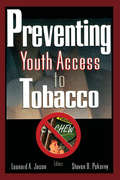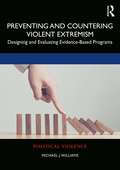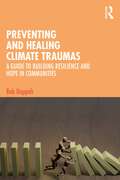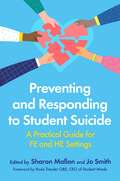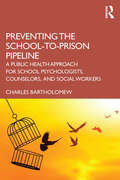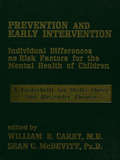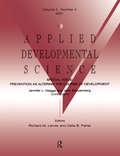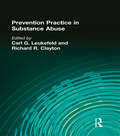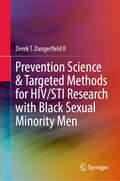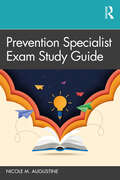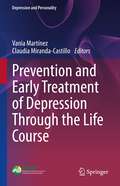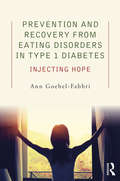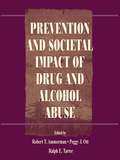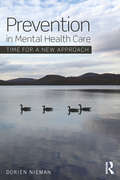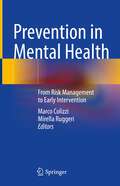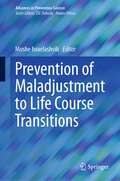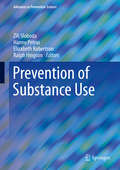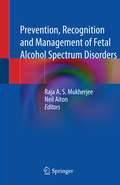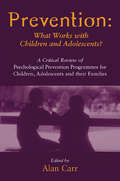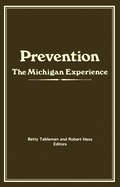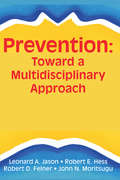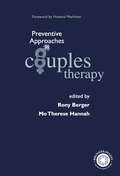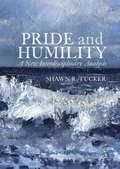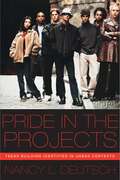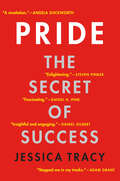- Table View
- List View
Preventing Youth Access to Tobacco
by Steven Pokorny Leonard JasonLearn to develop and assess comprehensive youth tobacco interventions!Preventing Youth Access to Tobacco examines the components of a preventive public health intervention directed at reducing the rate of youth tobacco use. This valuable book describes this innovative intervention, which involves making tobacco more difficult for young people to acquire and also calls for fines for possession of tobacco. It illustrates the rationale for this intervention and reviews the literature on the topic, pointing to findings that indicate that this kind of comprehensive intervention has been shown to be effective.From the editors: “The amount of human pain and suffering caused by tobacco use is immeasurable. Preventing youth smoking initiation of the most effective way of reducing long-term mortality from heart disease, chronic lung disease, and other tobacco-related disorders. Smoking is the leading preventable cause of death in the United States, killing over 400,000 people each year. This is more people than die of AIDS, homicide, suicide, automobile accidents, illegal drug use, and fires combined. Despite these facts, 22.9 of adult Americans and 13.8 of Americans under 18 smoke cigarettes.”This essential book can provide some much-needed answers, showing you: effective ways of reducing the rate of regular smoking among adolescents how to assess a community&’s readiness to change how to gauge the effectiveness of tobacco laws directed toward youth how to judge the comprehensiveness of school-based tobacco interventions what factors influence illegal tobacco sales to minors why merchants sell tobacco to kids illegally and what the legal risks are for minors who try to buy tobacco
Preventing and Countering Violent Extremism: Designing and Evaluating Evidence-Based Programs (Political Violence)
by Michael J. WilliamsThis textbook serves as a guide to design and evaluate evidence-based programs intended to prevent or counter violent extremism (P/CVE). Violent extremism and related hate crimes are problems which confront societies in virtually every region of the world; this text examines how we can prevent or counter violent extremism using a systematic, evidence-based approach. The book, equal parts theoretical, methodological and applied, represents the first science-based guide for understanding “what makes hate,” and how to design and evaluate programs intended to prevent this. Though designed to serve as a primary course textbook, the work can readily serve as a how-to guide for self-study, given its abundant links to freely available online toolkits and templates. As such, it is designed to inform both students and practitioners alike with respect to the management, design, or evaluation of programs intended to prevent or counter violent extremism. Written by a leading social scientist in the field of P/CVE program evaluation, this book is rich in both scientific rigor and examples from the “real world” of research and evaluation dedicated to P/CVE. This book will be essential reading for students of terrorism, preventing or countering violent extremism, political violence, and deradicalization, and highly recommended for students of criminal justice, criminology, and behavioural psychology.
Preventing and Healing Climate Traumas: A Guide to Building Resilience and Hope in Communities
by Bob DoppeltUsing extensive research, interviews with program leaders, and examples, Preventing and Healing Climate Traumas is a step-by-step guide for organizing community-based, culturally tailored, population-level mental wellness and resilience-building initiatives to prevent and heal individual and collective climate traumas. This book describes how to use a public health approach to build universal capacity for mental wellness and transformational resilience by engaging community members in building robust social support networks, making a just transition by regenerating local physical/built, economic, and ecological systems, learning how trauma and toxic stress can affect their body, mind, and emotions as well as age and culturally tailored mental wellness and resilience skills, and organizing group and community-minded events that help residents heal their traumas. These actions build community cohesion and efficacy as residents also engage in solutions to the climate emergency. This book is essential reading for grassroots, civic, non-profit, private, and public sector mental health, human services, disaster management, climate, faith, education, and other professionals, as well as members of the public concerned about these issues. Readers will come away from this book with practical methods—based on real-world examples—that they can use to organize and facilitate community-based initiatives that prevent and heal mental health and psycho-social-spiritual problems and reduce contributions to the climate crisis.
Preventing and Responding to Student Suicide: A Practical Guide for FE and HE Settings
by Sharon Mallon and Jo SmithThis practical book covers issues related to suicide risk, prevention and postvention in Higher and Further Education communities. Compiled by 37 experts, it is an authoritative guide to an issue that is causing increasingly large concern for FE and HE institutions and covers multiple evidence-backed approaches with a pragmatic focus. It is the first that specifically deals with student suicide in FE Colleges and universities, encouraging a holistic, institutional response. Chapters are split into three sections, beginning with understanding and preventing student suicide among students, followed by responses to risk, including a model for student prevention in HE settings. The book concludes with the response to student death by suicide with advice on postvention, and how to support bereaved family, staff, and students.
Preventing the School-to-Prison Pipeline: A Public Health Approach for School Psychologists, Counselors, and Social Workers
by Charles BartholomewPreventing the School-to-Prison Pipeline is the first book written to provide school psychologists and other K-12 mental health professionals with knowledge and strategies intended to help them disrupt the criminalization of historically oppressed learners in today’s classrooms. A phenomenon of the United States’ intersecting education and criminal justice systems, the school-to-prison pipeline is the process by which school staff punish already marginalized or at-risk students—primarily Black youth—in ways that enable a lifetime of targeting by police, court, and carceral operations. Exploring the unmet needs of students with mental, emotional, and behavioral health disorders, the effects of implicit and explicit bias, adverse school and court policies, and other biopsychosocial factors, this powerful book offers a preventative, public-health approach to providing clinical care to vulnerable students without compromising school safety. School psychologists, counselors, and social workers will come away with urgent and actionable insights into advocacy, collaboration, preventive interventions, alternative discipline measures in schools, and more.
Prevention And Early Intervention
by William B. Carey Sean C. McDevitPublished in 1994, Prevention And Early Intervention is a valuable contribution to the field of Psychiatry/clinical Psychology.
Prevention As Altering the Course of Development: A Special Issue of applied Developmental Science
by Richard M. Lerner Celia B. FisherPrevention and developmental sciences have many complementary goals and much to gain by collaboration. With random assignment to conditions and long-term multivariate follow-up of individuals across significant years in the life span, fundamental basic and applied research questions can now be addressed using new statistical methods. This special issue includes four empirical papers that used growth modeling techniques (hierarchical linear modeling, latent growth curve analyses) to examine direct and indirect effects of theory-based, longitudinal prevention experiments on developmental trajectories of children's and adolescents' substance use, delinquency, and school bonding.
Prevention Practice in Substance Abuse
by Carl G Leukefeld Richard R ClaytonHere is helpful information about joint activities for prevention researchers and practitioners. Prevention Practice in Substance Abuse provides cutting-edge information related to prevention research and practice. Too frequently, researchers and practitioners do not communicate from a basic understanding of concepts and principles. This book begins to fill that void by providing information and recommendations for practitioners and researchers to develop projects jointly so both groups become more effective in their work.Chapters in Prevention Practice in Substance Abuse are grouped into three areas: background chapters contain information related to prevention in the United States, data-based chapters present the most recent national and international evaluation findings, and conceptual chapters stimulate thought about drug abuse prevention. A concluding chapter explores recommendations for joint activities and presents methods for both practice and research to enhance knowledge development. Specific topics addressed by the contributing authors include: mass media campaigns morality and substance abuse Hungarian adolescent drug abuse parenting practices social influences-oriented substance abuse prevention curricula choosing a paradigm to guide research and practicePrevention Practice in Substance Abuse is an ideal guide for drug and alcohol practitioners and researchers who wish to become more effective in their work using strategies for cooperating with each other to combat the use and abuse of drugs and alcohol.
Prevention Science & Targeted Methods for HIV/STI Research with Black Sexual Minority Men
by Derek T. Dangerfield IIDespite substantial advances in HIV/STI treatment and prevention for general population health, sexual health disparities persist for Black gay, bisexual, and other Black sexual minority men (SMM). Strategies to build trust and overcome barriers are not well-established and solutions remain elusive. The contemporary prevention science landscape also requires updated perspectives in light of changing social policies, technological advancements, and prevention options. This book is the first to provide a comprehensive overview for sexual health prevention science using years of significant research from Dangerfield II et al. involving U.S. Black SMM in light of existing studies. This book identifies knowledge and practice gaps and proposes recommendations for innovative methods for academic collaboration with communities of practice. Researchers, clinicians, and public health practitioners will be guided through the sexual health research and intervention process using targeted contemporary studies to enhance their practice. This book serves as a valuable resource for enhancing the skills of emerging prevention scientists and clinicians. It also offers innovative strategies for experienced prevention experts to refine techniques and address persistent health disparities in sexual health outcomes. The book targets audiences across disciplines, including public health, sociology, psychology, nursing, medicine, anthropology, and population science and can be applied to marginalized communities globally. By bridging research, practice, and innovation, this book serves as a transformative resource for addressing sexual health disparities and empowering collaborative solutions to advance equity in the U.S. and around the globe.
Prevention Specialist Exam Study Guide
by Nicole M. AugustineThe Prevention Specialist Exam Study Guide helps readers to understand the competencies and knowledge necessary to become a Prevention Specialist (PS) and adequately prepares prevention professionals to pass the Prevention Specialist certification exam. With this book, Nicole Augustine aims to close the gap in existing literature for the PS exam and enhance the prevention workforce so that society is better equipped to address current and future substance misuse challenges and improve long-term health outcomes for all. Divided into six domains, each module of this study guide contains a self-assessment, suggested readings, and a review of the information covered in the PS exam. A chapter covering the overall credentialing process and the additional requirement variations by the state is included. Substance prevention professionals around the world looking to become a credentialed professional will find this one-of-a-kind resource indispensable.
Prevention and Early Treatment of Depression Through the Life Course (Depression and Personality)
by Vania Martínez Claudia Miranda-CastilloThis book presents current evidence of new perspectives for the prevention and appropriate management of depression in people across the life course. Special attention has been dedicated to facilitating factors for the development of health system capacity and the effectiveness of the different types of interventions. The first part of the book reviews the innovations in global prevention and non-pharmacological treatments for children, adolescents, and youths. The second part reviews interventions for adults across the lifespan, including older adults and caregivers. Despite the efforts to tackle depression, the COVID-19 pandemic directly or indirectly affected the mental health of the population, including an increase in the incidence of depressive disorders, which are underdiagnosed and undertreated in young and older people. Because of the characteristics of adolescence and older adulthood, people can consider depression signs and symptoms as natural, neglecting a proper diagnosis. To address these challenges in the clinical management of depression, Prevention and Early Treatment of Depression Through the Life Course presents a life course perspective on the analysis and treatment of depression to help clinical psychologists, psychiatrists and other mental health professionals understand the mechanisms associated with the onset of depression and identify/develop proper evidence-based treatments for different ages and in different circumstances.
Prevention and Recovery from Eating Disorders in Type 1 Diabetes: Injecting Hope
by Ann Goebel-FabbriPrevention and Recovery from Eating Disorders in Type 1 Diabetes: Injecting Hope sheds light on an often overlooked and misunderstood issue: the problem of eating disorders in women with type 1 diabetes – referred to by lay people and the media as "diabulimia" and characterized by insulin restriction as a means of calorie purging for weight loss. Drawing on a series of recent interviews and over 16 years of research and clinical experience with this unique phenomenon, author Dr. Ann Goebel-Fabbri provides groundbreaking insight into the lives of women who have recovered from eating disorders in type 1 diabetes. She explores the condition's origins, its effects on the lives of those affected, and possible paths to recovery. Also included are suggestions for prevention and treatment, as well as practical and inspirational advice from now-recovered women. Prevention and Recovery from Eating Disorders in Type 1 Diabetes is a valuable guide for patients and loved ones, diabetes treatment teams, and eating disorder clinicians.
Prevention and Societal Impact of Drug and Alcohol Abuse
by Robert T. Ammerman Peggy J. Ott Ralph E. TarterIt is generally acknowledged that the most cost-effective means of curtailing alcohol and drug abuse is prevention. Providing interventions to at-risk individuals before they develop serious problems with substance use is the most important component of the "war on drugs." Fortunately, the past decade has seen a dramatic increase in the quantity and quality of scientific research on those areas crucial to the advancement of prevention science. This book compiles a tremendous amount of information about prevention which has accumulated in recent years. Documenting these accomplishments and setting the stage for future efforts comprise the focus of this book. Prevention and Societal Impact of Drug and Alcohol Abuse is divided into four parts. Part I contains introductory chapters addressing current issues in prevention science and characteristics of abusable substances. Part II includes chapters on the historical contexts of substance abuse and the deleterious health consequences of alcohol and other drugs. Part III focuses on the impact of drug and alcohol abuse on society. Included are chapters on alcohol and drug abuse and driving, infectious illness, disability, managed care, the criminal justice system and adolescents and adults, sale and distribution, the media, and community responses. Part IV consists of chapters on prevention in specific settings and with certain populations.
Prevention in Mental Health Care: Time for a new approach
by Dorien NiemanPrevention in Mental Health Care: Time for a new approach focuses on the limitations in current psychiatric practice and research. Many professionals working in mental health care, as well as patients with psychiatric symptoms, are dissatisfied with what is currently offered by the discipline, with respect to the diagnosis and treatment of psychiatric disorders. This book discusses possibilities and opportunities for change, and is the first to combine recent scientific research results with insights from philosophy and art. Illustrating these points with elaborate case studies, Prevention in Mental Health Care promotes a deeper understanding and a new model of mental health care, with an emphasis on prevention and natural recovery. Prevention in Mental Health Care will be of use to qualified or trainee practitioners, clinical psychologists, psychiatrists, social workers, occupational therapists and nurses working with the current classification systems and treatment methods in psychiatry. Furthermore, the book will appeal to students, lecturers and researchers, as well as those with a general interest in mental health care.
Prevention in Mental Health: From Risk Management to Early Intervention
by Mirella Ruggeri Marco ColizziThe book brings together into a single text the interrelated but different research efforts to translate the current evidence on risk and outcome of severe mental disorders into a preventive perspective. The book also introduces a holistic approach to prevention in mental health, by combining biological, psychological and environmental evidence that attempts to blunt the risk and reduce the number of individuals with mental health vulnerabilities who eventually progress to the manifestation of a severe mental disorder. Finally, the book wants also to highlight the possibility to overcome the single disorder-oriented preventive approach in an attempt to intercept a wider at-risk youth population and explore clinical research areas underperformed where future efforts will have to concentrate. Mental health problems have their peak of incidence during the transition from childhood to young adulthood, interesting up to 20% adolescents. Half of those eventually developing such difficulties experience clinically relevant mental distress by the age of 14. Even more importantly, the symptomatic onset is generally anticipated by non-specific warning signs of psychosocial impairment potentially evolving in any severe mental disorder. This is of crucial importance, as almost one in two health problems contributing to the global disease burden across the 0-25 age span is a mental disorder. The search for preventive strategies among youth has developed over the past 2-3 decades, invigorated by a rethinking of mental disorders’ ineluctable prodromal phase into a period where the trajectory of illness can be slowed down, blunted, or even halted. The paradigms for implementing preventing approaches in mental health have often developed independent of each other. This book aims at summarizing the available evidence and make a step towards a more mature vision of the potentialities of promotion and prevention in mental health.
Prevention of Maladjustment to Life Course Transitions (Advances in Prevention Science)
by Moshe IsraelashviliThis book provides a comprehensive and updated review of the concepts, models, and interventions related to the process of adjustment to life course transitions. In times of transition, an individual is exposed to experiences that require them to assume new roles and exhibit updated behaviors. Regardless of the characteristics of these transitions, exposure to normative trajectories imposes on the person an intensive engagement in a process of (re-)adjustment. Sometimes this demand is beyond the scope of one's ability, motivation, or comprehension. Hence, some people might ineffectively perceive and/or react to the change and end up feeling unable to handle the change and inclined to escape the situation. A preventive intervention that either reduces the impact of possible risk factors or fosters possible protective factors would support the people in managing the transition. While the importance of prevention of maladjustment is repeatedly mentioned in the literature, this is the first-known book on how to prevent maladjustment. It examines how the sense of transition emerges, what adjustment means, the models that elaborate on how people manage in times of transition, what the antecedents of maladjustment are, and especially how maladjustment could be prevented. Out of these discussions, a new model, The Transitional Stress and Adjustment (TSA) Model, is suggested as a grand framework for paving a way forward to better prevent people's maladjustment to life course transitions. Prevention of Maladjustment to Life Course Transitions is a much-needed cornerstone in the future development within the prevention science framework. This book has interdisciplinary appeal for researchers, practitioners, and graduate students in psychology, sociology, public health, social work, criminology, medicine, health sciences, public policy, economics, and education who consider prevention an important vehicle of intervention to promote health and wellbeing. Its focus on the topic of adjustment also would be of special interest to those who explore child and youth development.
Prevention of Substance Use (Advances in Prevention Science)
by Zili Sloboda Hanno Petras Elizabeth Robertson Ralph HingsonThis volume provides a serious examination of substance use prevention research and practice as components of the continuum from health promotion through to prevention and health care in sub-groups and in the general population. Extensive background chapters provide portals into the evolution of the field and the cutting edge research being conducted on the etiology, epidemiology, and genetics of substance use and abuse. The global nature and health burden of substance use and abuse incorporates assessments of the serious problems related to the prevention of legal substance use (i.e., alcohol and tobacco) and how lessons learned in those arenas may apply to the prevention of illicit substance use. Research and practice chapters detail a range of effective evidence-based programs, policies and practices and emerging prevention interventions from the literatures on the family and school contexts in addition to innovations involving mindfulness and the social media. Continued advancements in substance use prevention research, practice, training, and policy are projected.Included among topics addressed are:Progression of substance use to abuse and substance use disordersThe tobacco prevention experience: a model for substance use prevention?Policy interventions: intended and unintended influences on substance useQualitative methods in the study of psychoactive substance useUse of media and social media in the prevention of substance useSupporting prevention science and prevention research internationallyThe array of research accomplishments and real-world methods presented in Prevention of Substance Use merits the attention of a variety of researchers and practitioners, including public health professionals, health psychologists, and epidemiologists.
Prevention, Recognition and Management of Fetal Alcohol Spectrum Disorders
by Raja A. S. Mukherjee Neil AitonThis book presents clinical assessment and management solutions for those people who are exposed to Alcohol in Pregnancy. Over the last few decades we have begun to understand the enduring effects of prenatal alcohol exposure on the developing fetus. The consequence of prenatal alcohol exposure - Fetal Alcohol Spectrum Disorders is a lifelong disorder and affects children and adults. It is a condition which is significantly under-recognised for many reasons. Assessment and diagnosis requires the input of multiple different professionals, and referral pathways are often poorly developed or non-existent. Information to support and guide these professionals in practical ways, what to do and how to help, remains limited. This book seeks to fill some of that gap by offering professionals, clear and useable research-based information and guidance that will help in their practice whilst also being a useful resource for anyone new to this increasingly recognised area of work. The book is divided into four broad areas bringing together chapters authored by experts in their field including those with lived experiences. Part one focuses on presenting an overview of the condition, and approaching women about their alcohol use and risk followed by part two focusing more around diagnostic issues. Part three follows with management advice, and part four revolves around policy and health prevention in general. Each chapter is designed to offer insight but also practical tips and support in an accessible manner. The book offers an essential guide for a broad range of health and social care professionals working with this condition.
Prevention: A Critical Review of Psychological Prevention Programmes for Children, Adolescents and their Families
by Alan CarrPrevention: What Works with Children and Adolescents? deals with the prevention of psychological problems which are of central concern to those who fund and develop health, social and educational services for children, adolescents and their families. Problems addressed in this book include developmental delay in low birth weight infants and socially disadvantaged children; adjustment problems in children with sensory and additional disabilities and autism; challenging behaviour in children with intellectual disabilities; physical and sexual abuse; bullying; adjustment problems in children with asthma and diabetes; teenage smoking; alcohol use and drug abuse; teenage pregnancy, STDs and HIV infection; post-traumatic adjustment problems and adolescent suicide. Conclusions drawn in this book are based on the results of over 200 rigorously conducted studies of more than 70,000 children.
Prevention: The Michigan Experience
by Robert E HessProviding practical information for all prevention professionals, this helpful volume presents an in-depth look at the excellent program models and prevention efforts used in the state of Michigan. Contributors discuss pilot demonstrations and model developments to illustrate what a state can do to further prevention efforts.
Prevention: Toward a Multidisciplinary Approach
by Robert E HessThis new book takes a detailed look at different disciplines as they relate to prevention. Authors examine how a multidisciplinary approach to prevention can refine and increase the effectiveness and comprehensiveness of the field. Given the complexity of the problems facing society today, many professionals are recognizing the strong need for collaborative efforts in the area of prevention. Prevention: Toward a Multidisciplinary Approach will help you gain a clearer perspective of this need and will provide invaluable insights into the intitial steps required for successful collaboration.
Preventive Approaches in Couples Therapy
by Mo Therese Hannah Rony BergerPreventive Approaches in Couples Therapy is the first thorough overview of the leading approaches to preventing marital distress and dissolution. Written for professionals, paraprofessionals, and lay people involved in the development and implementation of preventive programs, the editors have created a resource accessible to all those in the field of couples therapy. The volume serves as an important resource for programs that the therapist may already use and as an insightful introduction into new programs that can strengthen and invigorate these existing therapeutic approaches.
Pride and Humility
by Shawn R. TuckerThis interdisciplinary analysis presents an innovative examination of the nature of pride and humility, including all their slippery nuances and points of connection. By combining insights from visual art, literature, philosophy, religious studies, and psychology, this volume adapts a complementary rather than an oppositional approach to examine how pride and humility reinforce and inform one another. This method produces a robust, substantial, and meaningful description of these important concepts. The analysis takes into account key elements of pride and humility, including self-esteem and self-confidence, human interconnectedness, power's function and limitations, and the role of fear. Shawn R. Tucker explores the many inflections of these terms, inflections that cast them by turns as positive or negative, emboldening or discouraging, and salubrious or vicious depending upon the context and manner in which they are used.
Pride in the Projects: Teens Building Identities in Urban Contexts (Qualitative Studies in Psychology #5)
by Nancy L. DeutschTeens in America’s inner cities grow up and construct identities amidst a landscape of relationships and violence, support and discrimination, games and gangs. In such contexts, local environments such as after-school programs may help youth to mediate between social stereotypes and daily experience, or provide space for them to consider themselves as contributing members of a community.Based on four years of field work with both the adolescent members and staff of an inner-city youth organization in a large Midwestern city, Pride in the Projects examines the construction of identity as it occurs within this local context, emphasizing the relationships within which identities are formed. Drawing on research in psychology, sociology, education, and race and gender studies, the volume highlights the inadequacies in current identity development theories, expanding our understanding of the lives of urban teens and the ways in which interpersonal connections serve as powerful contexts for self-construction. The adolescents’ stories illuminate how they find ways to discover who they are, and who they would like to be — in positive and healthy ways — in the face of very real obstacles. The book closes with implications for practice, alerting scholars, educators, practitioners, and concerned citizens of the positive developmental possibilities inherent in youth settings when we pay attention to the voices of youth.
Pride: The Secret of Success
by Jessica Tracy“Jessica Tracy has flipped the script on pride, showing that it’s not just a deadly sin to be avoided, but also a vitalizing virtue to be nurtured.” —Robert Cialdini, New York Times–bestselling author of InfluenceWhy did Paul Gauguin abandon middle-class life to follow the path of a starving artist? What explains the massive success of Steve Jobs, a man with great ideas but weak programming skills and a questionable managerial style? How did Dean Karnazes—the famed “Ultramarathon Man”—transform himself from a directionless desk jockey into an extreme athlete who once ran fifty marathons in fifty days? As the renowned emotion researcher Jessica Tracy reveals, each of these superachievers has been motivated by an often maligned emotion: pride. Its dark, hubristic side is well known, but Tracy shows that pride is also essential for helping us become our best, brightest selves. It makes us strive for excellence. In the right doses and the right contexts, it has been proven to boost creativity, motivate altruism, and confer power and prestige on those who display it. In Pride, Tracy explains how we can make this double-edged emotion serve us—rather than the other way around.Previously published in hardcover as Take Pride“A revelation. A renowned psychologist, Jessica Tracy explains that seeking our best self is nothing to be ashamed of, but that seeking praise at all costs gets us into the worst kind of trouble” —Angela Duckworth, #1 New York Times–bestselling author of Grit“Fascinating . . . Tracy uses original research to show that pride is a major part of what it means to be human and can be harnessed as a force for good.” —Daniel H. Pink, New York Times–bestselling author of Drive
